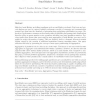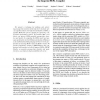946 search results - page 44 / 190 » Process Algebra and Non-Interference |
298
Voted
ACMMPC
2000
Springer
15 years 7 months ago
2000
Springer
Abstract. Functional programs are merely equations; they may be manipulated by straightforward equational reasoning. In particular, one can use this style of reasoning to calculate...
120
click to vote
FMCO
2005
Springer
15 years 8 months ago
2005
Springer
We present a method for decomposing modal formulas for processes with the internal action τ. To decide whether a process algebra term satisfies a modal formula, one can check whe...
151
Voted
PE
2011
Springer
14 years 9 months ago
2011
Springer
High-level semi-Markov modelling paradigms such as semi-Markov stochastic Petri nets and process algebras are used to capture realistic performance models of computer and communic...
132
click to vote
FORTE
2004
15 years 4 months ago
2004
This paper describes the tool CASPA, a new performance evaluation tool which is based on a Markovian stochastic process algebra. CASPA uses multi-terminal binary decision diagrams ...
112
click to vote
MASCOTS
2003
15 years 3 months ago
2003
We present a technique for defining and extracting passage-time densities from high-level stochastic process algebra models. Our high-level formalism is PEPA, a popular Markovian...



